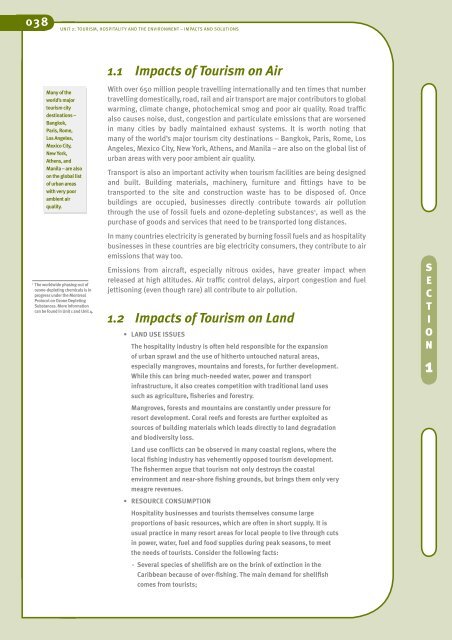Online version: PDF - DTIE
Online version: PDF - DTIE
Online version: PDF - DTIE
Create successful ePaper yourself
Turn your PDF publications into a flip-book with our unique Google optimized e-Paper software.
038<br />
UNIT 2: TOURISM, HOSPITALITY AND THE ENVIRONMENT – IMPACTS AND SOLUTIONS<br />
Many of the<br />
world’s major<br />
tourism city<br />
destinations –<br />
Bangkok,<br />
Paris, Rome,<br />
Los Angeles,<br />
Mexico City,<br />
New York,<br />
Athens, and<br />
Manila – are also<br />
on the global list<br />
of urban areas<br />
with very poor<br />
ambient air<br />
quality.<br />
1<br />
The worldwide phasing-out of<br />
ozone-depleting chemicals is in<br />
progress under the Montreal<br />
Protocol on Ozone Depleting<br />
Substances. More information<br />
can be found in Unit 1 and Unit 4.<br />
1.1 Impacts of Tourism on Air<br />
With over 650 million people travelling internationally and ten times that number<br />
travelling domestically, road, rail and air transport are major contributors to global<br />
warming, climate change, photochemical smog and poor air quality. Road traffic<br />
also causes noise, dust, congestion and particulate emissions that are worsened<br />
in many cities by badly maintained exhaust systems. It is worth noting that<br />
many of the world’s major tourism city destinations – Bangkok, Paris, Rome, Los<br />
Angeles, Mexico City, New York, Athens, and Manila – are also on the global list of<br />
urban areas with very poor ambient air quality.<br />
Transport is also an important activity when tourism facilities are being designed<br />
and built. Building materials, machinery, furniture and fittings have to be<br />
transported to the site and construction waste has to be disposed of. Once<br />
buildings are occupied, businesses directly contribute towards air pollution<br />
through the use of fossil fuels and ozone-depleting substances 1 , as well as the<br />
purchase of goods and services that need to be transported long distances.<br />
In many countries electricity is generated by burning fossil fuels and as hospitality<br />
businesses in these countries are big electricity consumers, they contribute to air<br />
emissions that way too.<br />
Emissions from aircraft, especially nitrous oxides, have greater impact when<br />
released at high altitudes. Air traffic control delays, airport congestion and fuel<br />
jettisoning (even though rare) all contribute to air pollution.<br />
1.2 Impacts of Tourism on Land<br />
• LAND USE ISSUES<br />
The hospitality industry is often held responsible for the expansion<br />
of urban sprawl and the use of hitherto untouched natural areas,<br />
especially mangroves, mountains and forests, for further development.<br />
While this can bring much-needed water, power and transport<br />
infrastructure, it also creates competition with traditional land uses<br />
such as agriculture, fisheries and forestry.<br />
Mangroves, forests and mountains are constantly under pressure for<br />
resort development. Coral reefs and forests are further exploited as<br />
sources of building materials which leads directly to land degradation<br />
and biodiversity loss.<br />
Land use conflicts can be observed in many coastal regions, where the<br />
local fishing industry has vehemently opposed tourism development.<br />
The fishermen argue that tourism not only destroys the coastal<br />
environment and near-shore fishing grounds, but brings them only very<br />
meagre revenues.<br />
• RESOURCE CONSUMPTION<br />
Hospitality businesses and tourists themselves consume large<br />
proportions of basic resources, which are often in short supply. It is<br />
usual practice in many resort areas for local people to live through cuts<br />
in power, water, fuel and food supplies during peak seasons, to meet<br />
the needs of tourists. Consider the following facts:<br />
- Several species of shellfish are on the brink of extinction in the<br />
Caribbean because of over-fishing. The main demand for shellfish<br />
comes from tourists;<br />
S<br />
E<br />
C<br />
T<br />
I<br />
O<br />
N<br />
1
















